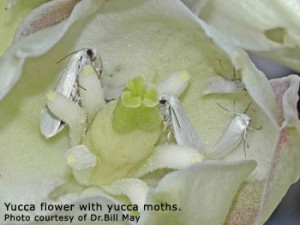Mutualisms & Cheaters
Most mutualisms have cheaters which exploit the relationship for gain, without providing any material or service in return. This is true in the case of insects which gather pollen and/or nectar and do not pollinate the plant, and in the case of plants which trick insects into pollinating them without receiving any benefit.
Plant Cheaters
Plant cheaters can deceive the insects via false food or sexual rewards. For example, several species of orchid mimic a female wasp, ant, or sawfly (via odor more than visual appearance) and attract males of the mimicked species which attempt to mate with it, through which pollen transfer is achieved. The male wasp receives nothing from the plant in return. Click here to see a video of this behavior on YouTube.com (video will open in a new window).
False food rewards are the case in fly-pollinated plants, which often smell fetid or putrid to mimic rotting meat or dung, the fly’s natural food and host substrate for larvae. The fly is attracted to the smell and pollinates the plant without receiving any food that it can use.

Figure 7.56: Marmalade fly sitting on a grey-haired rockrose, its face and legs covered in pollen.
Image from URL: http://en.wikipedia.org/wiki/File:Episyrphus_balteatus_-_head_close-up_(aka).jpg, Author: André Karwath
Insect Cheaters

Figure 7.57: Yucca flower with yucca moths.
Image from URL: http://www.fs.fed.us/wildflowers/, Author: Dr. Bill May
There are also cheaters on the insect side. There are moth cheaters in the yucca system that lay eggs in developing yucca fruits that have already been pollinated. Not only does the moth provide no service to the plant, but its larvae may destroy every seed in a fruit, so that the plant is unable to reproduce. Even the pollinators, though, are not 100% effective, making the relationships among yuccas and yucca moths complex.
Other well known cheaters are nectar-robbing bees which slit open the base of a flower with their mouthparts and suck the nectar from there, avoiding contact with the stamens and stigma. This is common behavior in carpenter bees. Still, similar to the yucca case, the relationship between flowers and nectar robbers can be complicated.
Click here to see a video on of this behavior on YouTube.com (video will open in a new window).